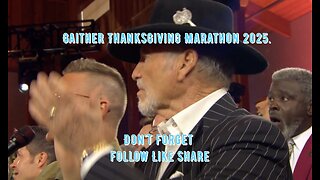Premium Only Content

"Naaman's Greatest Need" This is a very important message… It’s real and true
"Naaman's Greatest Need" Pastor Hobbs Nails another great lesson… You don’t want to miss…
Lessons from the story of Naaman are very applicable to our lives today. Although these events unfolded long ago, if we look closely, many of us can relate to Naaman and the plight he found himself in. In this post we will be exploring six things we can learn from Naaman.
THE STORY OF NAAMAN SUMMARY
The story of Naaman is found in 2 Kings 5. Naaman was a powerful warrior in the Syrian army who had leprosy. The biblical meaning of Naaman means “pleasant”.
He lived up to his name. He found out from a little slave girl that the Israelite prophet Elisha could heal him. Naaman responded pleasantly to her recommendation.
He went to visit Elisha who told him to go dip in the Jordan river 7 times. He was very upset about this instruction and initially refused to do it.
But his servants spoke some sense into him and he decided to follow Elisha’s direction.
After dipping 7 times, he was healed of his leprosy. Thereafter, he stopped worshiping false gods and turned his faith toward the God of Israel.
The whole Elisha and Naaman story is way more exciting than this summary.
I recommend that you read it through for yourself in 2 Kings 5.
WHAT DO WE LEARN FROM THE STORY OF NAAMAN?
This is a story rich with meaning. We now delve into some lessons from the story of Naaman.
NO MATTER HOW POWERFUL, WE ARE ALL VULNERABLE
One of the first lessons from the story of Naaman is that no matter how powerful we think we are as human beings, we are not as powerful as we seem.
Naaman was an outstanding warrior. Through him, Syria had won many wars against Israel. And he was very wealthy too.
Despite all this, Naaman had a big problem: he was a leper.
Who is a leper according to the Bible?
Leprosy was one of the deadliest diseases of Bible times. Anyone who had leprosy was called a leper.We now know that it is a disease that causes the nerves in the body to deteriorate.
So lepers probably experience loss of sensation in parts of the body. Since there was no cure, it was all downhill from there. The first visible sign of the disease was tiny red bumps on the skin.
Leprosy makes your body rot while you’re still living.Those red bumps become white, shiny scaly sores. Then they get bigger.
Soon, the whole body is covered with them. The hands and feet get disfigured. Hair begins to fall out.
Because the nerves can no longer alert the body to danger, fingers and toes fall off because of infection and other things.
Your whole face could be eaten away by this disease before you die. It was just a horrible and humiliating and absolutely slow and painful way to die.
How did Naaman get leprosy? How did he come down with such a horrible disease? Naaman is one of the most popular characters who had leprosy in the Bible.
Other characters that we know of are: Miriam (Numbers 12:10), Moses (Exodus 4: 6-7), Gehazi (2 Kings 5:20), Simon (Matthew 26: 1-13).
They all were afflicted with leprosy in various ways. In the case of Miriam and Moses, God performed a miracle.
But the Bible doesn’t tell us how Naaman got leprosy. In those days, leprosy was said to be contagious. Not so much now.
The CDC has lost of interesting updated information about leprosy. Check out the question about modern leprosy versus leprosy in Bible times.
Whatever is true of leprosy now, Naaman, in all his glory, realized how fallible and mortal he was.
We never realize the value of physical health until it is in jeopardy. We should be making sure we are taking care of the bodies God has blessed us with.
Although he was still in active duty, he knew that his days were numbered. He knew his death sentence was suspended for as long as the disease would ravage his body.
No matter how great life is now, we always have to remember how vulnerable we are.
PRIDE WILL MAKE US MISS OUR BREAKTHROUGH AND BLESSING
The second lesson from the story of Naaman, has to do with pride. Naaman was a very proud man. His status made him so.
He won many victories in war. He had the utmost respect in his land.
So when Elisha did not see him directly, he was not happy.
To make matters worse, Elisha sent him to go wash in the dirtiest river around.
Naaman was about to walk away from his opportunity to live because he felt disrespected.
I like to think that he was not desperate enough. I am quite sure he must have already tried everything possible.
And just because he was not receiving the kind of respect and welcome that he was accustomed to, he was about to give up on his blessing.
Solomon was right:
Pride goes before destruction, a haughty spirit before a fall. (Proverbs 16:18)
Pride shows up in many ways. Thinking that we are better than others for whatever reason.
Thinking that certain tasks are beneath us. Thinking that everyone should treat us the way we deserve to be treated.
For by the grace given me I say to every one of you: Do not think of yourself more highly than you ought, but rather think of yourself with sober judgment, in accordance with the faith God has distributed to each of you. (Romans 12:3)
Joseph's coat of many colors
YOU MAY ALSO LIKE: Joseph’s coat of many colors: Meaning, significance and lessons learned.
GOD DOES NOT ALWAYS WORK ACCORDING TO OUR EXPECTATIONS
Naaman was not happy with Elisha’s instructions. He did not want to wash in the Jordan because it was the muddiest, dirtiest river around.
There were far better options.
But Naaman went away angry and said, “I thought that he would surely come out to me and stand and call on the name of the Lord his God, wave his hand over the spot and cure me of my leprosy. Are not Abana and Pharpar, the rivers of Damascus, better than all the waters of Israel? Couldn’t I wash in them and be cleansed?” So he turned and went off in a rage. (2 Kings 5:11-12)
Little did he know that that is just how God always works. He almost never does what we think He is going to do or what we think he should do.
God has a way of challenging our thoughts, our pride, our regular way of thinking about him. With every miracle, He stretches us to change. In surprisingly strange ways, our boundaries are pushed.
One of the lessons from Naaman’s story we can take away is that when we ask God for something, we should maybe leave ourselves open because we never know which direction God will come from.
For my thoughts are not your thoughts, neither are your ways my ways,” declares the Lord. “As the heavens are higher than the earth, so are my ways higher than your ways and my thoughts than your thoughts. (Isaiah 55:8-9)
HUMILITY CAN SAVE YOUR LIFE, LITERALLY
Another one of the powerful lessons from the story of Naaman is what we can draw from his response to his servants.
His story tells us that although Naaman thought highly of himself, he was also a reasonable and logical man. He was humble enough to listen to those he led.
Naaman’s servants went to him and said, “My father, if the prophet had told you to do some great thing, would you not have done it? How much more, then, when he tells you, ‘Wash and be cleansed’!” (2 Kings 5:13)
A wise mom, a wise pastor, a wise classroom teacher, a wise supervisor, a wise leader could learn something.
We can learn that no matter how far up we serve, there is merit in the voices of those who look up to us.
No matter how we think we have things figured out, we do not. And often enough, the answer will come from a mind that is considered simple.
It is notable that his servants felt comfortable enough to talk with him. This says something about the kind of relationships he had with them.
This is another lesson from the story of Naaman. As we lead, we must make ourselves approachable and relatable. It could literally save ourselves.
Sometimes life’s most timely and powerful advice comes from unlikely places. It is important to treat others like people.
No matter the difference in economic or social status, everyone has something to contribute to our lives.
GOD REWARDS COMPLETE OBEDIENCE
Naaman dipped in the dirty water 7 times because he was instructed by Elisha to do so. The word used for dip in 2 Kings 5:14 is tabal.
It really means to plunge or immerse something or someone. This word is particularly used when describing dipping in water for purification or dipping in blood for the purpose of sacrificing.
When Naaman went into that water, he was all in! He completely submerged himself in that dirty water.
He demonstrated his complete obedience and submission to God in this act.
This was like a baptism for him.
And guess what?
He came up clean. Scripture says his skin was restored so that it looked like a baby’s skin. Imagine that on a grown man who had been a warrior with too many scars to count.
But there is more.
Naaman was not just cleansed from leprosy. His soul was washed as well. He received salvation that day, just like the woman with the issue of blood.
When we submit ourselves in obedience to God, whatever he does for us is complete and is well done. God never leaves anything partially done. If you’re all in, God is all in as well.
And that’s why he deserves all the glory!
Elisha did not accept Naaman’s gifts because he wanted Naaman to know that his healing had nothing to do with Elisha but everything to do with the God of Israel.
If Elisha had accepted those gifts, he would be accepting the glory that God should get. In refusing the gifts, Naaman came to understand that his faith and obedience moved the heart of God.
And this is what it would continue to take for him to worship the true God.
GOD WORKS WITH FAITH, EVEN IF IT’S IMPERFECT
Naaman had some superstitious beliefs about how God works, like the woman with the issue of blood.
After Elisha heals him, Naaman asks to take some soil from Israel back to Syria. There was a belief that specific gods had power over particular places. So Naaman thought that the land of Israel was God’s territory.
Therefore, taking the soil with him would allow Naaman to stand on Yahweh’s “holy ground” to worship the God of Israel.
Naaman’s beliefs were quite in line with the culture and practices of his time and the way he was raised. But God did not withhold his miracle. God honored the obedience and faith he demonstrated.
Naaman took a step in the right direction and God acknowledged it. Elisha supported his new found faith walk by allowing him to take the soul.
One of the take away lessons from the story of Naaman is that God meets us where we are.
No matter how feeble or misguided our faith, he is looking for that one step that shows Him that we believe in his existence and His power. The rest God will deal with over time.
Naaman was such a great example of faith that Jesus talked about him.
And there were many in Israel with leprosy in the time of Elisha the prophet, yet not one of them was cleansed—only Naaman the Syrian. (Luke 4:27)
Jesus was talking Jews who were raised to believe gentiles were created for hell. This statement was a compliment to the faith of gentiles like Naaman which made these Jews angry.
But if Jesus uses him as an example, then we can certainly take a page from Naaman’s book.
FINAL WORDS ON LESSONS FROM THE STORY OF NAAMAN
We have certainly not exhausted all the lessons from 2 Kings 5. We did not even go into the little slave girl and Gehazi.
But these lessons from the story of Naaman are so powerful! Put away pride. Expect God to do weird things in answer to our desires. Listen to the seemingly insignificant voices. Obey God completely.
God works with even imperfect faith. We are human and vulnerable to this earthly life no matter how accomplished or wealthy we might seem.
I hope today will be a new leaf for you, just like Naaman
-
 3:09:38
3:09:38
Christian News, Videos. Sermons
10 hours agoGaither Thanksgiving Marathon 2025
12 -
 57:44
57:44
TruthStream with Joe and Scott
2 days agoShe's of Love podcast & Joe:A co-Hosted interview, Mother and Daughter (300,000+Facebook page) Travel, Home School, Staying Grounded, Recreating oneself, SolarPunk #514
33.1K1 -
 30:49
30:49
MetatronHistory
1 day agoThe Truth about Women Warriors Based on Facts, Evidence and Sources
32.9K13 -
 2:59:08
2:59:08
FreshandFit
14 hours agoA Sugar Baby & A Feminist ALMOST Fight Each Other
265K66 -
 6:24:23
6:24:23
SpartakusLIVE
12 hours agoFriday Night HYPE w/ YOUR King of Content
111K2 -
 2:27:53
2:27:53
Laura Loomer
10 hours agoBREAKING: MTG Resigns From Congress, Mamdani Meets Trump
76.6K130 -
 3:30:10
3:30:10
PandaSub2000
1 day agoDisney & Buzz Trivia | PHOENIX & HAVIX (Original Live Version)
38K1 -
 15:23
15:23
T-SPLY
14 hours agoBUSTED Assistant Principle And Brother Arrested For Wanting To Kill ICE!
34.4K14 -
 22:06
22:06
Jasmin Laine
15 hours agoCBC STUNNED Into SILENCE After JD Vance’s BRUTAL Message to Canadians
27.4K19 -
 2:04:27
2:04:27
TimcastIRL
13 hours agoAntifa CONVICTED Of TERRORISM, Fears Of CIVIL WAR Grow | Timcast IRL
260K104